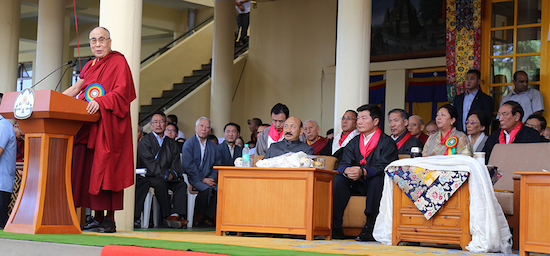
(TibetanReview.net, May28, 2016) – The head of the exile Tibetan administration at Dharamshala, India, Sikyong Lobsang Sangay, on May 27 called the Dalai Lama a beacon of hope, trashed the Dholgyal group’s allegations of discrimination, reaffirmed his administration’s adherence to the Middle Way Approach towards China and stressed education as top priority as he took his oath of office for a second term of five years at a ceremony on the Tsuglakhang courtyard.
He renewed his pledge to see His Holiness the Dalai Lama return to Tibet within the next five years while calling on the Tibetan people to stand by this goal even if it took 50 years, calling this promise of effort, hope and call for patience a 5/50 policy.
The oath-taking ceremony took place in the presence of the Dalai Lama, Tibet’s spiritual leader, and was administered by the Chief Justice Commissioner of the Tibetan Supreme Justice Commission Mr Kargyu Dhondup.
In his address to the large public gathering, the Dalai Lama praised “the marvellous and determined spirit of the Tibetan people” in Tibet. However, he lamented the fact that a lack of sound moral principles lay behind the regionalist rifts that emerged in the Tibetan community during the recent general election.
He said: “Regional divisiveness results from short-sightedness. In the 7th, 8th and 9th centuries the three provinces of Tibet were united. Tibetans employed the same script and followed what was explained in the Kagyur and Tengyur that are written in the common Tibetan language. To allow rifts in our unity is a mistake. People of all three provinces should stick together through good times and bad. This is true of everyone from leaders to ordinary people.”
He also called for a sense of community among the different religious traditions of Tibet, saying: “Those of you who are Lamas, Geshes and religious practitioners should also remember that whatever particular tradition you follow, they all have their source in the Nalanda Tradition. Differences between us are relatively superficial. All our traditions, Nyingma, Sakya, Kagyu, Jonang and Gelug have produced great masters. When we talk about Dharma, we need to be true to it in practice.”
And calling for unequivocal stand in their behaviour, the Dalai Lama called on the gathering of the Tibetan leaders and public: “If you consider me your friend, please pay attention to what I have said.”
The Kalons (ministers) of the 15th Tibetan Kashag (cabinet) in exile, numbering up to seven, will take their oath of office on Jun 1, after being proposed by the Sikyong and affirmed by the 16th Tibetan Parliament in Exile.
Before that, the members of the 16th parliament will take their oath of office on May 30 while the new Speaker and Deputy Speaker will do so the next day.


